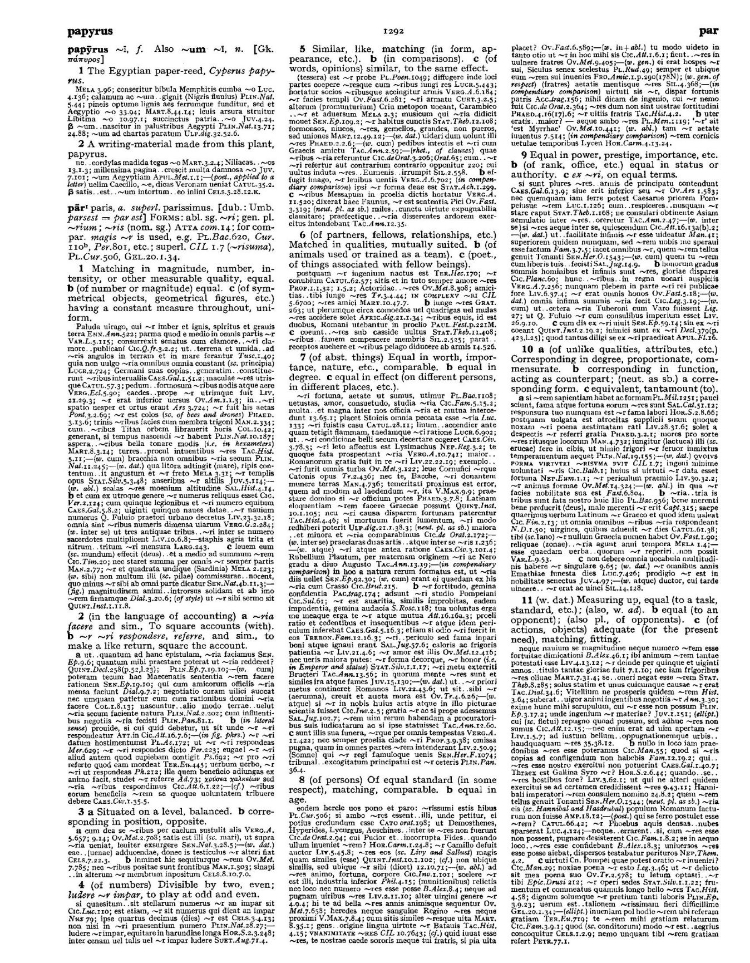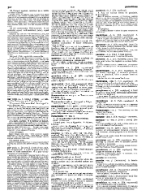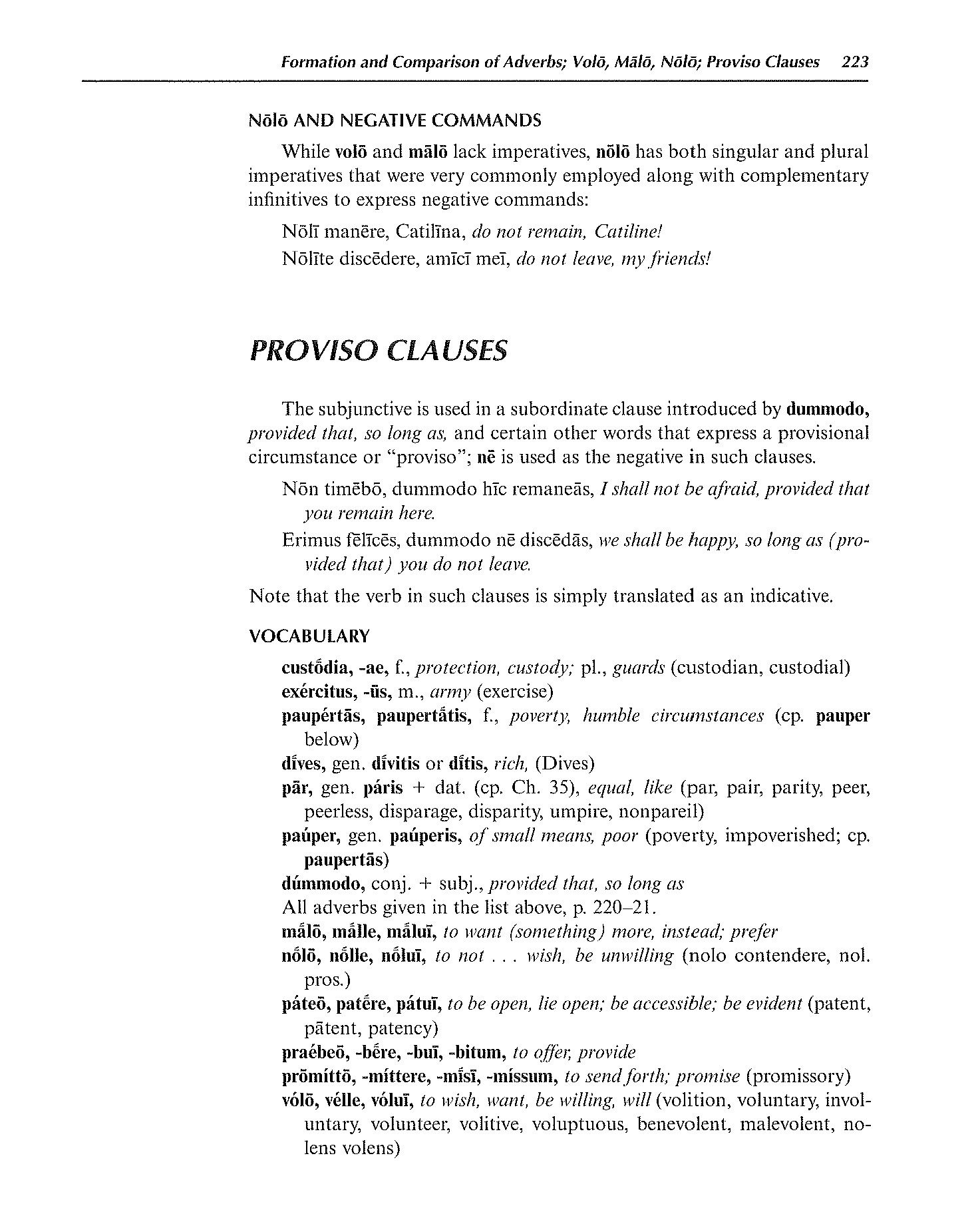
page_listing.tpl
page_subListingDetails.tpl
sub_listingDetails_style1.tpl
sub_listingDetails.title.tpl
pār equal
pār is a Latin Adjective that primarily means equal.
Definitions for pār
Wheelock's Latin
Adjective
- 1
equal, like
English derivatives:
par pair parity peer peerless disparage disparity umpire nonpareil
Oxford Latin Dictionary
Noun
- 1
A person of the same kind. (b) an equal in rank, prestige, etc.
- 2
A mate, partner. (b) a partner at dinner.
- 3
An adversary.
Adjective
- 1
Matching in magnitude, number, intensity, or other measurable quality, equal. (b) (of number or magnitude) equal. (c) (of symmetrical objects, geometrical figures, etc.) having a constant measure throughout, uniform.
- 2
(in the language of accounting) (a) ~ria facere and sim., To square accounts (with). (b) ~r ~ri respondere, referre, and sim., to make a like return, square the account.
- 3
(a) Situated on a level, balanced. (b) corresponding in position, opposite.
- 4
(of numbers) Divisible by two, even; ludere ~r impar, to play at odd and even.
- 5
Similar, like, matching (in form, appearance, etc.). (b) (in comparisons). (c) (of words, opinions) similar, to the same effect.
Sentences with pār
Latin to English
Quīdam mālunt crēdere omnēs esse parēs.Compare Certain men prefer to believe that all men are equal.
Quīdam negant mentēs quidem omnium hominum esse parēs.Compare Certain men say that all men's minds at least are not equal.
Ille vidētur pār esse deō.Compare That man seems to be equal to a god.
Nec quemquam iam ferre potest Caesarve priōrem, Pompeiusve parem. (Lucan, De bello civili I.125-126)Compare Caesar cannot tolerate a superior, nor Pompey an equal.
Par navis numerus Cn. Octavius, praetor prior annus, decerno.Compare They decreed an equal number of ships to Cneius Octavius, the praetor of the preceding year.
Facio iniuria fortis vir, qui paucus par hic civitas fero.Compare I do an injury to a very brave man, to whom this state has produced few equal.
Data sources
Notes
- Definitions
- Frederick M. Wheelock, Wheelock's Latin, 6th ed., rev. Richard A. LaFleur (New York, NY: HarperCollins Publishers, 2005): 223.
- P. G. W. Glare, Oxford Latin Dictionary, Vols. 1-8 (Oxford: Clarendon Press, 1982): 1292.
- Word frequencies
- Christopher Francese, "Latin Core Vocabulary," Dickinson College Commentaries, last modified 2014, http://dcc.dickinson.edu.
- Paul B. Diederich, The Frequency of Latin Words and Their Endings, PhD diss., (Columbia University, 1939).
Bibliography
Allen, Joseph H. Allen and Greenough's New Latin Grammar for Schools and Colleges: Founded on Comparative Grammar. Edited by James B. Greenough, George L. Kittredge, Albert A. Howard, and Benjamin L. D'Ooge. Boston, MA: Ginn & Company, 1903.
Crystal, David. A Dictionary of Linguistics and Phonetics. 6th ed. Oxford, UK: Blackwell Publishing, 2008.
Delatte, Louis, Suzanne Govaerts, Joseph Denooz, and Etienne Evrard. Dictionnaire fréquentiel et index inverse de la langue latine [Frequency Dictionary and Inverse Index of the Latin Language]. Liège, Belgium: Laboratoire d'analyse statistique des langues anciennes de l'Université de Liège (L.A.S.L.A.), 1981.
Diederich, Paul B. The Frequency of Latin Words and Their Endings. PhD diss., Columbia University, 1939.
Francese, Christopher. "Latin Core Vocabulary." Dickinson College Commentaries. Last modified 2014. http://dcc.dickinson.edu/latin-vocabulary-list.
Gildersleeve, Basil L., and Gonzales Lodge. Gildersleeve's Latin Grammar: Third Edition, Revised, and Enlarged. 3rd ed. London, England: Macmillan and Co., 1903.
Glare, Peter G.W. Oxford Latin Dictionary. Vols. 1-8. Oxford, England: Clarendon Press, 1982.
Krüger, Bernd. "Latin Conjugation Tables." Cactus2000. Accessed May 5, 2023. https://latin.cactus2000.de/index.en.php.
Pierson, Nick. "Sound of Text." Accessed October 26, 2019. https://soundoftext.com.
Wheelock, Frederick M. Wheelock's Latin. 6th ed. Revised by Richard A. LaFleur. New York, NY: HarperCollins Publishers, 2005.
Wiktionary Contributors. "Victionarium." Wikimedia Foundation, Inc. Updated March 18, 2019. https://la.wiktionary.org/wiki/Victionarium:Pagina_prima.
Citation
Chicago (17th ed.)
Allo Contributors. "pār, gen. paris (adj.) - Latin Word Definition." Allo Latin Dictionary. Last modified . Accessed February 19, 2026. http://ancientlanguages.org/latin/dictionary/par.
Entry created on . Last updated on .








